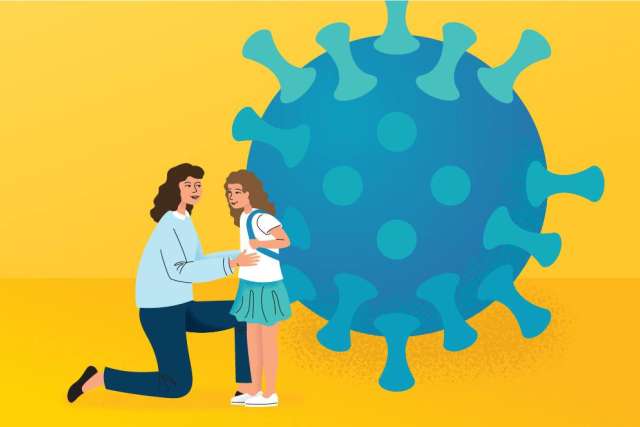Post-COVID syndrome in children may lead to difficulties with thinking, concentrating, playing sports or participating in their usual activities, according to the Centers for Disease Control and Prevention.
“I would advise parents it is important to just be aware this a real syndrome in children and they should be on the lookout for it if their child has COVID,” says Annabelle de St. Maurice, MD, MPH, an associate professor of pediatrics in the division of infectious diseases at the David Geffen School of Medicine at UCLA.
Dr. de St. Maurice says that researchers are still studying the risk factors for long COVID in children, but those who have been hospitalized or had more severe cases appear to be at greater risk.
“Getting their child vaccinated is one of the best ways to protect against severe COVID and COVID infection,” she says. “Fortunately, the vaccines are available for the youngest children now.”
Long COVID, which is defined as symptoms that last more than four weeks after infection, can persist for weeks, months or years. Symptoms can also come and go, according to the CDC.
Children may experience prolonged fatigue, brain fog, headaches, shortness of breath, rapid heart rate or pain in the muscles or joints, Dr. de St. Maurice says.
“We know infection itself triggers some of these symptoms such as fatigue or shortness of breath, but if it lasts four weeks or more, that’s sufficient for concern,” she says, adding that parents should then consult their child’s pediatrician.
Just as for adults, Dr. de St. Maurice said that treatment for long COVID in children is multidisciplinary, depending for instance on whether symptoms are cardiac or neurologic.
Academic challenges
Long COVID in children can result in more absences from school or a need for special education services.
The American Academy of Pediatrics says that children dealing with post-COVID symptoms should not be penalized for symptoms that affect learning or completion of assignments. For instance, the group notes that brain fog may result in inattentiveness, slower reading or processing and the need for more repetition.
Dr. de St. Maurice says parents should talk to teachers about any additional support children with long COVID may need.
“If they’re having difficulty concentrating, parents should alert the teachers to provide special modifications to their schedules or homework assignments,” she says. “If the child has problems with exercise, that would be something to advise their physical education teachers and anyone who might be monitoring recess about.”
Examples of accommodations could include extra time on tests or scheduled rest periods during the school day, according to the CDC.
Prevalence
While long COVID appears less common in children than adults, it’s also difficult to determine the number of children affected. For instance, children, especially younger ones, may have difficulty describing their symptoms, Dr. de St. Maurice says.
That could also explain why research has suggested that older children andteens are more likely to have post-infection symptoms than younger kids.
Additionally, Dr. de St. Maurice says there’s commonality between some mental health symptoms that have been brought on by the isolation of the pandemic and symptoms associated with long COVID.
“We know that people who have depression may be more tired, might have less energy than individuals without depression,” she says. “There’s some overlap in the symptoms.”
Prevention
Dr. de St. Maurice says vaccination, to prevent infection and reduce severity of illness, is the best measure for protecting against post-COVID syndrome. Children 6 months and older are eligible.
She noted one recent published in the Journal of American Medicine that found that vaccinated health care workers who became were less likely to develop long COVID. The same could be true for vaccinated children, she says.
“We don’t know for sure until we study it, and it may be hard to come to those conclusions given the small number of children with long COVID, but I think it’s promising that the vaccines may be protective,” she says.
Dr. de St. Maurice says that even if a child has already had COVID, it’s important to still get vaccinated for optimal protection. Masking also provides another layer of protection.
“Getting vaccinated after having natural infection boosts your immune response and provides future protection,” she says.
Families should also make sure their children get their boosters when eligible, she says. Parents should balance between meeting their child’s social needs and taking precautions. That could mean planning more activities outdoor or testing before large gatherings.
“Children are social beings and they’re learning how to interact with each other,” Dr. de St. Maurice says. “I think it’s important to weigh the risks and benefits and doing as much as you can to make it as safe as possible, realizing children can’t exist in a bubble.”
Get the latest information on COVID-19 vaccines.
Courtney Perkes is the author of this article.
Related



